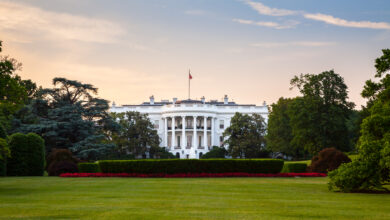We Have Many Giant Leaps for Mankind Yet to Take

This day 50 years ago, they wheeled a television set into the lodge at our summer camp outside of Readfield, Maine and we watched, mesmerized, as men first walked on the moon.
I remember getting peppered with questions about it from the other kids because it had become known that under my bed I kept a big box full of every clipping I could find about the Apollo program. My parents sent some. I found some.
Back home in New Jersey, I had two tall file cabinets full of more clippings and file after file of documents from NASA which responded to each one of my letters with more pictures of astronauts, brochures and press releases.
Hanging from the ceiling and on the shelves in my bedroom were models of the spacecraft, my pride and joy being a Saturn V rocket and then an even larger scale command, service and lunar excursion module set.
It was a pretty thrilling time to be a kid, when every few months astronauts took us to where we had never been before, revealed that the impossible was within reach. That\’s no exaggeration. That\’s what it felt like.
Sometimes people ask \”was it worth the cost?\” Quite apart from the scientific and historical value the programs brought, there was something else even more precious being produced.
There was the sense of limitless possibilities it infused us with, the sense that we were at the onset of one of the greatest periods of exploration and discovery in the history of the world.
In many ways, we were. Going to the moon, launching probes into deep space, landing rovers on Mars were all part of that. Revolutions in computing and natural sciences also came, in part driven by this program.
But it is impossible not to look back and and lament the degree to which we did not capture all the momentum from those early days of the space program as we might have, that we did not continue on with manned spaceflight as we should have.
It\’s hard to calculate the intangibles that drive nations and civilizations forward. There is no GIP (gross inspiration product) being calculated, not even, as my father, a scientist, argued for, a GKP (gross knowledge product) to measure a country\’s vital knowledge resources.
But one cannot help but be alive for the past 50 years and conclude that something from that time has been lost. We have problems here on earth to resolve, no doubt. We have limited economic resources, that is true.
But exploration and discovery and daring and vision have been the keys to how each society since the dawn of man have helped resolved such day-to-day concerns. They are not unrelated. To the contrary, they are an essential part of the solutions.
We need bold national and international projects not just to rise to the great challenges of our era but to remind us what is possible and to unlock for us the power of what was previously unknown.
Perhaps, with some luck, looking back as we do today on the remarkable achievements of 50 years ago will remind us how vital it is that we constantly strive to fully tap our potential and unleash the human spirit.
It might be that addressing our climate crisis is one such challenge we rise to–saving our planet as it faces its direst threat is an even more challenging undertaking than reaching other worlds.
It might be that it is mapping and unlocking the secrets of the human brain–which contains more neurons and synapses than there are stars in the universe. But it must also necessarily mean that we continue the work started by American and Russian scientists so long ago.
We are a speck in the infinite and if we are to amount to more than that we must not just \”throw off the bonds of earth\” but the limitations it imposes on our vision. We need to continue to explore because that is what man has always done, to defy the limits of the past.
That requires first and foremost leaders who are not just bureaucrats or politicians seeking to serve their narrow self-interests and those of their sponsors. We need leaders who, like John F. Kennedy, who urge to do things not because they are easy but because they are hard.
We need leaders who both inspire and understand how important inspiration is to a nation that would continue to flourish. Ideally, we will find ways to do this that cross national boundaries & advance the interests of all mankind-as Neil Armstrong said he was doing 50 yrs ago today.
Perhaps one of them, perhaps all of us, will realize that moments like today when we look backwards are, at their most powerful and useful, actually reminders to turn our attention in a different direction…forward and beyond where we have ever been before.




